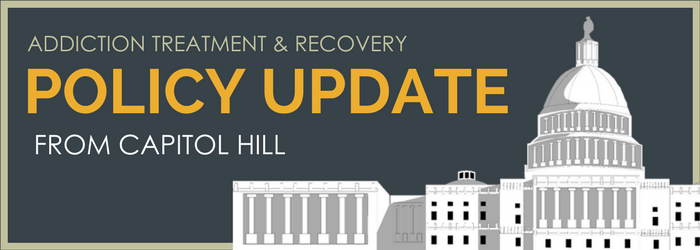
April 6, 2017 |
April 2017 Addiction Policy Update

Affordable Care Act Repeal & Replacement
On March 24th, House leadership canceled a vote on the American Health Care Act (AHCA) when it became clear the votes were not there for passage. At a press conference following the announcement Speaker Ryan (R-WI) said, “We’re going to be living with Obamacare for the foreseeable future.”
To gain conservative votes, House leadership and President Trump made many changes to the bill in the week leading up to the scheduled House vote in an effort to appeal to various elements of the Republican Conference. Some of the changes included eliminating the mandatory coverage of addiction treatment by giving states the discretion to determine essential health benefits requirements for private plans for the purposes of tax credits, allowing states to receive Medicaid funds as a block grant, and increasing the State Stability Fund by $15 billion for the purposes of covering maternity care, mental health, and substance use disorder treatment. However, these modifications failed to garner the necessary 216 votes for passage as changes that appealed to conservatives cost moderate votes and vice versa.
AHCA was described by Republican leadership as one part of a 3 part effort to repeal and replace the Affordable Care Act (ACA) – the other two elements included additional legislation that could not move under the Senate’s reconciliation rules and regulatory changes. Speaker Ryan said at least the regulatory changes under Secretary Price will likely go forward but said they will be hampered by the ACA still being the law.
While House leaders and the White House have promised that ACA repeal and replacement legislative efforts will continue, there is little clarity on if a new package could be developed that could overcome the hurdles that doomed the AHCA and how long that might take. One Republican House member told us, “I know I’m supposed to tell you I know what’s going to happen, but the truth is I don’t and none of us do.”
During the first week in April, the White House attempted to lead a new round of negotiations, but finding common ground between conservatives and moderates remained difficult; Speaker Ryan (R-WI) said they are still in the conceptual phase and no timeline for consideration has been decided on.
On April 6, as the House adjourned for a 2 week recess, the House Rules Committee considered an amendment to the AHCA to establish a $15 billion high risk pool. The amendment leaves decisions about the specifics of the program to HHS and the states and does not specify how insurers would apply for reimbursement or which claims would qualify. While the full House did not take up the amendment before recessing, leadership warned they could be called back to Washington during the break (see memo from Leader McCarthy (R-CA)).

The amendment & its consideration at the Rules Committee is considered by some insiders to be:
- A concession to the White House who reportedly wanted a House floor vote before the recess
- Something to show progress on ACA repeal & replace efforts and give some cover to Republicans as Members head home for the 2 week Congressional recess.
Why it Matters
The ACA requires health plans in the individual/small group markets and Medicaid expansion benefit to cover addiction and mental health treatment and comply with the Mental Health Parity and Addiction Equity Act (MHPAEA).
Repeal of the law without an adequate replacement plan could eliminate these benefits and other consumer protections such as the prohibition on annual and lifetime caps and discrimination against individuals with pre-existing conditions.
EXECUTIVE ORDER
President Trump signed an executive order on March 29th establishing a commission to address the opioid misuse and overdose epidemic. The Commission will be headed by New Jersey Governor Chris Christie.
While there was some praise for the Administration for addressing the issue, some advocates were critical of the plan, saying that another commission is duplicative of the work already done by the Surgeon General last year. See more from Politico.
This Policy Update was generously provided by Holly Strain & Carol McDaid of Capitol Decisions.
